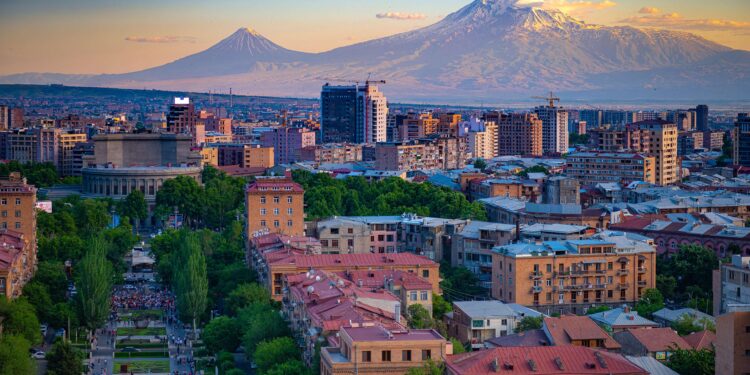Armenia is poised to make “final decisions” regarding its membership in the Collective Security Treaty Organization (CSTO) if Russia continues to refrain from condemning Azerbaijani occupation in the region, according to a recent statement reported by OC Media. The declaration signals growing frustration within Yerevan over Moscow’s perceived inaction amid escalating tensions and territorial disputes with Azerbaijan. As Armenia reconsiders its strategic alliances, the developments could have significant implications for regional security dynamics in the South Caucasus.
Armenia Signals Potential Break from CSTO Amidst Growing Frustration Over Russian Inaction
Armenia has hinted at a decisive reconsideration of its membership in the Collective Security Treaty Organization (CSTO) if Moscow continues to refrain from addressing Azerbaijani territorial advances. Officials express mounting discontent over the CSTO’s perceived inertia, with Armenian authorities underscoring that Russia’s failure to publicly condemn Azerbaijan’s occupation undermines regional stability and Armenia’s security guarantees. This potential pivot spotlights a critical juncture in Armenia-Russia relations, as the South Caucasus country weighs the benefits of its long-standing alliance against the reality of Moscow’s passivity amid escalating tensions.
Key grievances fueling Armenian frustration include:
- Lack of explicit CSTO response to recent Azerbaijani incursions
- Perceived erosion of collective defense commitments
- Increasing need for alternative security frameworks
| Issue | Armenia’s Expectation | Current CSTO Response |
|---|---|---|
| Territorial Integrity | Strong condemnation of occupation | No official criticism issued |
| Collective Defense | Rapid military support | Limited engagement, cautious diplomacy |
| Alliance Credibility | Commitment reaffirmation | Growing skepticism |
With public statements indicating a forthcoming “final decision” on the CSTO membership, Armenia is signaling readiness to recalibrate its security policy. Analysts suggest this move could propel Armenia toward diversifying its international partnerships or seeking new regional alliances, highlighting a broader strategic recalculation in response to shifting geopolitical realities. The coming months are poised to reveal whether Moscow will adjust its stance or face the prospect of losing one of its key CSTO members.
Analyzing the Impact of Azerbaijani Occupation on Regional Security and Armenia’s Strategic Choices
The recent Azerbaijani occupation has significantly complicated the security landscape in the South Caucasus, placing Armenia at a critical crossroads regarding its future alliances and defense strategies. The lack of strong condemnation from Russia, a key CSTO ally, has tested the bloc’s credibility and effectiveness. Armenia’s leadership has signaled an impending reassessment of its commitment to the Collective Security Treaty Organization, emphasizing that without a clear stance against Azerbaijan’s territorial advances, Armenia may reconsider its participation. This recalibration reflects growing frustration over perceived inaction and the urgent need for a security framework that prioritizes Armenian territorial integrity.
Key factors influencing Armenia’s strategic pivot include:
- Perceived erosion of CSTO unity and reliability in conflict deterrence
- The search for diversified security partnerships beyond traditional allies
- The need to bolster domestic defense capabilities amid ongoing regional tensions
- Increasing public and political pressure to take decisive action
| Security Aspect | Current Status | Potential Change |
|---|---|---|
| Russian Response | Neutral/Non-critical | Conditional criticism or none |
| Armenia’s CSTO Membership | Committed but strained | Reevaluation or withdrawal |
| Regional Stability | Volatile | Potential escalation or new alliances |
Experts Recommend Diversifying Alliances and Enhancing National Defense Capabilities to Safeguard Sovereignty
With tensions escalating over Azerbaijani control of disputed territories, analysts urge Armenia to reevaluate its strategic partnerships beyond the Collective Security Treaty Organization (CSTO). Many experts contend that reliance on a single alliance, particularly one perceived as hesitant to confront Azerbaijan’s advances, could undermine Armenia’s long-term security and sovereignty. Strengthening relations with a broader spectrum of international actors, including the European Union and Western defense partners, is viewed as a pragmatic approach to diversify diplomatic and military support.
Simultaneously, there is a robust call within policy circles for Armenia to augment its own defense capabilities through enhanced military modernization and increased investment in domestic defense technologies. Experts emphasize the necessity of advancing:
- Improved intelligence and surveillance systems for early threat detection
- Higher troop readiness and advanced training programs to counter asymmetric warfare
- Development of strategic infrastructure to secure borders and critical routes
- Increased defense budget allocation to support sustained military operations
| Area | Current Status | Recommended Action |
|---|---|---|
| Alliance Dependency | High reliance on CSTO | Diversify international partnerships |
| Military Readiness | Moderate training levels | Enhance training & modernization |
| Border Security | Vulnerable detection systems | Invest in intelligence surveillance |
Insights and Conclusions
As Armenia signals it may make “final decisions” regarding its membership in the CSTO amid perceived inaction from Russia over the Azerbaijani occupation, the region faces potential shifts in security alliances that could reshape the Caucasus geopolitical landscape. How Armenia’s next steps will impact the balance of power and the fate of the conflict remains closely watched by both regional and international actors.















